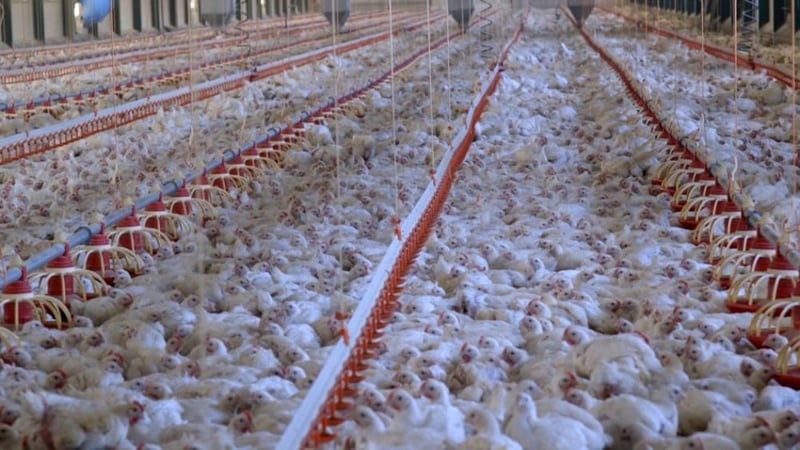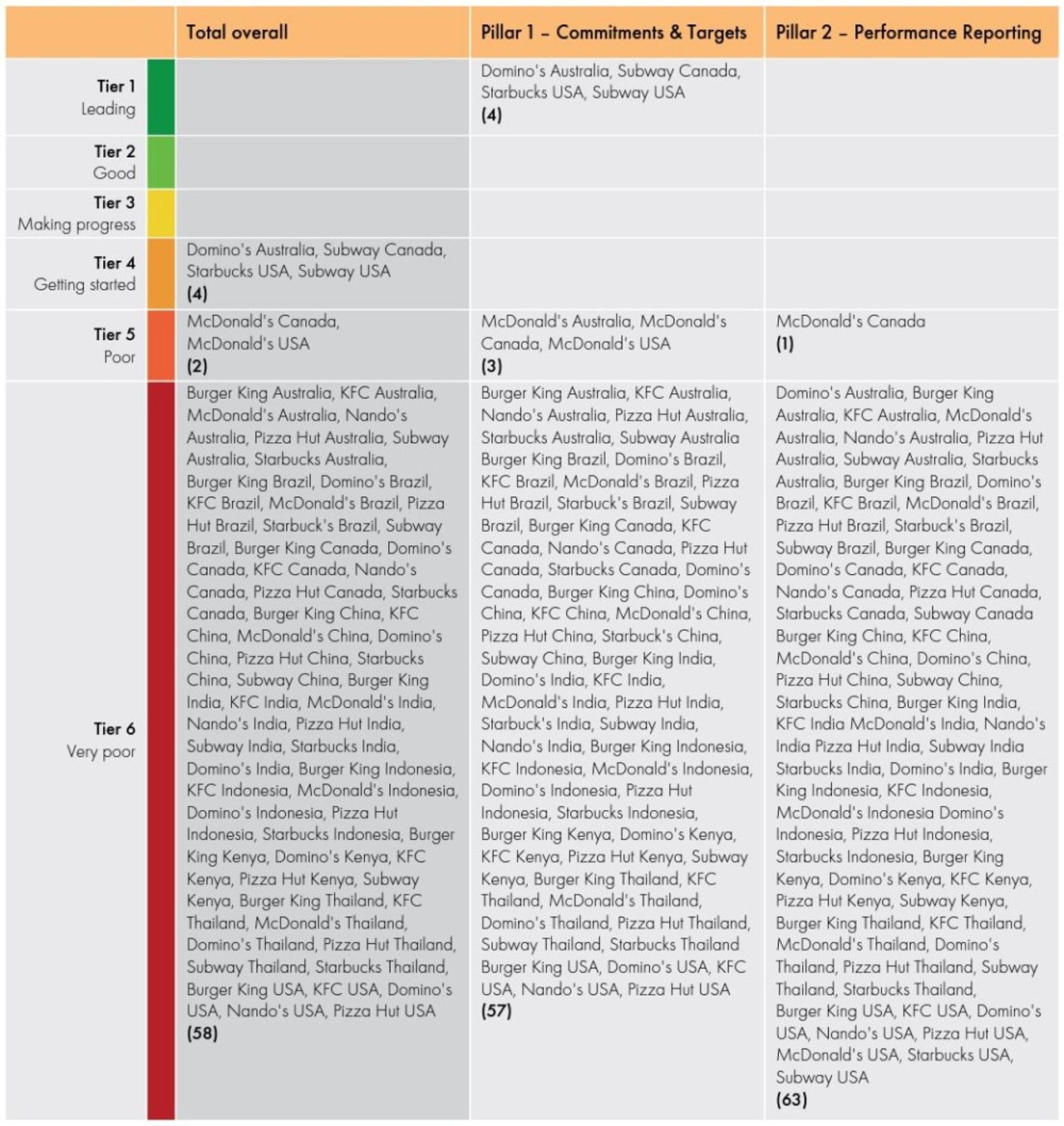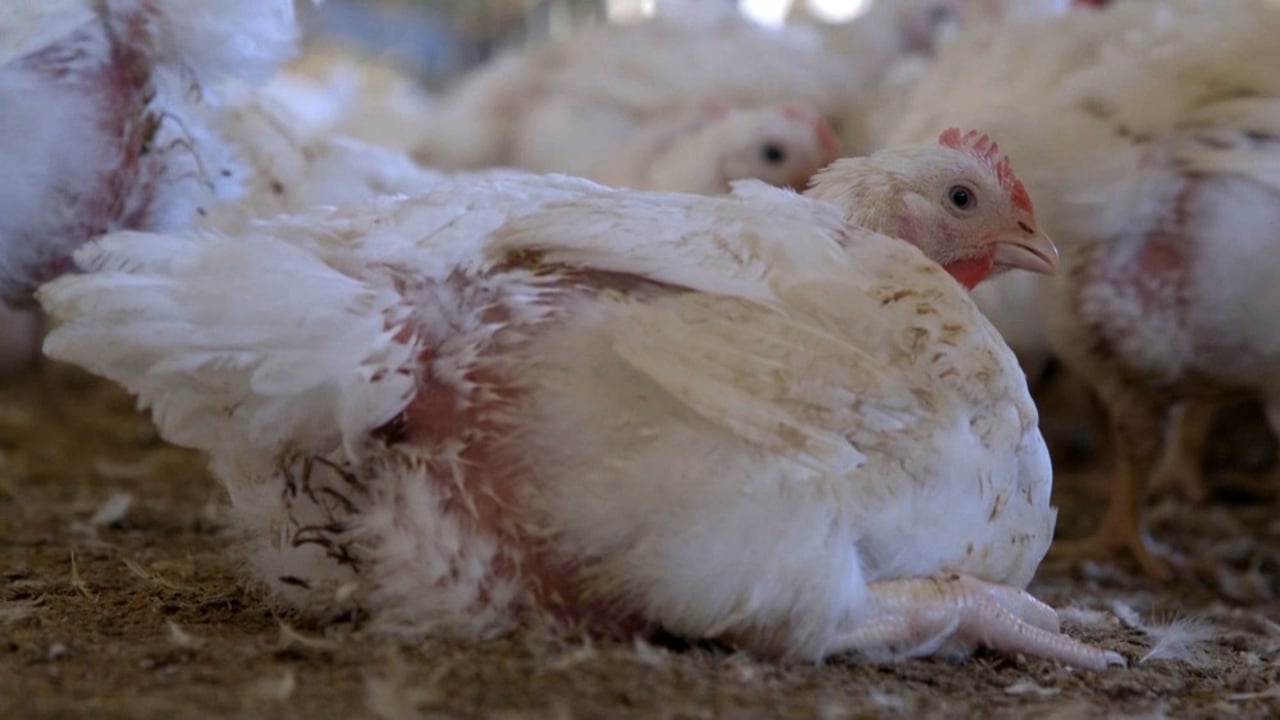
The Pecking Order 2022 report: Canadian fast-food chains are failing chickens
News
Each year billions of chickens are subjected to unnecessary suffering at the hands of fast-food companies who refuse to take the welfare of the chickens in their meat supply chain seriously. For the fourth year in a row, we’ve rated eight global fast-food companies on how well they treat their chickens around the world and these are the results...
Chickens are inquisitive and social animals. Sadly, they often live their entire lives in chronic pain, suffering from lameness, skin lesions, and even heart failure caused by selective breeding, which leads to an unnaturally fast growth rate. Crammed on factory farm floors with little to no environmental enrichment, they are also prevented from exhibiting their natural behaviours such as foraging, dustbathing, and perching.
For the last four years, we have been ranking fast-food restaurants based on their chicken welfare policies, considering their commitments to make improvements, and their reporting on implementing these commitments.
While there has been some progress made on improving chicken welfare and some companies are innovating by offering meat-free options on their menus, most companies have received embarrassingly low scores in our latest report, The Pecking Order 2022.
Fast-food companies are failing chickens and ignoring their customers
Big brands continue to ignore urgent consumer demands and animal welfare science, subjecting billions of chickens to unimaginable suffering every year.
Companies' inaction is not only an animal welfare issue, but human health is also being jeopardized due to antibiotic overuse in farming, fueling a deadly superbug crisis. Raising welfare standards will reduce the need for routine antibiotics used to prevent disease amongst animals kept in appalling conditions, thereby helping to lower the risk of antibiotic resistance in humans.
These companies are failing people, animals, and the planet.
They know that consumers are not interested in paying for animal suffering and are increasingly holding companies accountable for how animals used in their supply chains are treated. There is no justification for profiting from the pain of billions of sentient animals.
32-day old broiler (meat) chickens in a commercial indoor system.
How Canadian fast-food service restaurants scored
Canadian companies scored poorly, with most receiving “very poor” across the three measures of ‘overall grade,’ ‘commitments & targets’ grade, and ‘performance and reporting’ grade.
The overall scores for the fast-food services evaluated in Canada are as follows:
KFC — very poor (7%)
KFC Canada is falling far behind their United Kingdom (UK) and European counterparts. While KFC Canada has made no welfare commitments that align with the BCC, KFC subsidiaries in the UK and seven Europe countries have committed to the standards outlined in the European Chicken Commitment (ECC).
Pizza Hut — very poor (7%)
Pizza Hut scored very poor around the globe, with all countries failing to make improvements for chickens.
Burger King — very poor (9%)
Burger King scored very poor around the globe, with all countries failing to make improvements for chickens.
Nando's — very poor (0%)
Nando’s Canada is falling far behind their UK counterpart who has committed to the BCC standards for broiler chicken welfare.
McDonald's — poor (32%)
McDonald’s Canada received some points for its commitment to more humane slaughter methods – 100% of the Canadian supply chain facilities utilize Controlled Atmospheric Stunning (CAS). The company has made specific commitments on measuring welfare outcomes and providing enrichments, which are positive improvements; however, they are not aligned with the BCC, hence their overall low score.
Subway — getting started (50%)
Subway has committed fully to the criteria outlined in the BCC but has failed to report on their progress towards meeting those commitments, hence their low score on the ‘Performance and Reporting’ pillar. Overall, Subway scored 50%, or ‘getting started’, which is far higher than other food services companies assessed in the Canadian market.
Starbucks — very poor (0%)
Starbucks Canada scored ‘very poor’ across both pillars – commitments & targets, and performance reporting, lagging behind Starbucks USA who were among the highest scoring assessments indicating that they are ‘Getting Started’ on their journey to better manage broiler chicken welfare.
Domino's — very poor (0%)
Domino’s Canada scored ‘very poor’ across both pillars – commitments & targets, and performance reporting, lagging behind Domino’s Australia who were among the highest scoring assessments indicating that they are ‘Getting Started’ on their journey to better manage broiler chicken welfare.
It is clear most Canadian food service restaurants are not taking the welfare of meat chickens in their supply chain seriously.
What these companies can do to improve
Most of these companies fall far behind their UK and European counterparts. For example, while KFC Canada has made no welfare commitments that align with the BCC, KFC subsidiaries in the UK and seven Europe countries have committed to the standards outlined in the European Chicken Commitment (ECC). Similarly, Nando’s UK has committed to the BCC standards for broiler chicken welfare.
To meet the 2024 deadline of the Better Chicken Commitment (BCC), those companies scoring poorly will need to commit and expedite the implementation of the criteria outlined in the BCC, as well as ensure they are reporting on those commitments.
View all of the Canadian company scores on page 15 in the Pecking Order Report 2022.
How you can help chickens
Caring about the lives of farm animals is a choice we can all make. The conditions in which farm animals live and die can be improved by our purchase power.
One of the most impactful things you can do for the welfare of chickens and other farm animals is to reduce the amount of meat you eat. There are many great recipes and meal plans that can help you. We have developed one to offer this option and support to anyone interested. Sign up for free today.
We understand that it’s not always possible to reduce or stop eating meat and other animal products. Another impactful thing you can do is to choose animal products that are made from high welfare farming methods.
Food produced through high welfare farming methods, including high welfare free range and organic production can also have health benefits for you and is better for the environment.
You can help farm animals live a better life by making informed decisions at restaurants and grocery stores. Get our free guide to learn more about different welfare standards and help decode grocery store labels.

